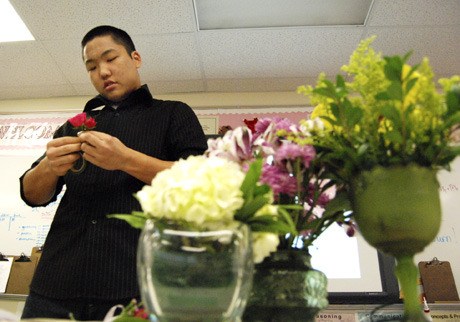Class of 2010 completes senior projects as the School Board considers changes
Mercer Island High School commenced its third year of culminating project presentations on March 16 and 17, as the entire school gathered in classrooms to watch the seniors deliver the year-long undertaking — their key to graduation.
Just days earlier, the Mercer Island School Board conducted its annual review of the senior culminating project with program coordinator Mike Radow at its March 11 meeting.
The review includes nearly 40 pages of survey results from MIHS students, teachers and parents. Most of the responses are positive, although criticism of the state-required program is also present.
Positive feedback was given for the school’s choice to scale down project time requirements. In 2008, the first year that the culminating project was required, seniors had to log in 80 hours of work. This was reduced — per student and parent request — to 50 hours the following year, a requirement that still stands.
Another change that the district — which, according to state law, has control over culminating project requirements and implementation — introduced was to schedule project presentations for March rather than May.
As seniors are especially busy in the last months of school, the calendar change to March eased up their academic schedules. It also allows those 12th-graders who fall behind more time to complete their projects before graduation in June.
Survey answers show that these two changes were appreciated by students and parents alike. On the subject of falling behind the March deadline, 65 percent of the parents polled said that students should be given the chance to meet a later deadline.
In fact, 93 percent of those polled said that students should have the opportunity to begin their projects in the summer before their senior year, which has been allowed in previous years. This begged the question: How early should MIHS students begin work on their culminating project?
It is a question that Superintendent Gary Plano approaches with an open mind.
“The culminating project is about getting kids passionate [for a topic]. Kids get passionate about things at age 10, so why not start their culminating project sophomore year?” Plano asked the School Board.
Board members agreed that having MIHS students start early on the 50-hour project would not be a bad idea.
Another recommendation included in the review was to allow students greater flexibility in choosing their project “mentor,” so that seniors can work with teachers “more familiar with the nature of their projects.” Currently, a student’s mentor is his or her BRIDGES leader.
This idea, however, was met with ambivalence among School Board members, as such shuffling around could cause organizational problems.
Another recommendation that received lukewarm response from Board members was to have MIHS teachers “be permitted to offer students an opportunity to complete their culminating project in the context of courses they teach.”
“We have to look and make sure that classes are a good venue for the culminating project,” Plano said.
School Board members added that such a setup could create extra stress for teachers. Radow and Plano agreed that the idea needed more research and conversation.
Radow will return to the School Board this summer with updates and further recommendations on ways to possibly improve the culminating project. Until then, this year’s seniors are — by the vast majority — done with one of their most challenging tasks at MIHS.
For more information on the culminating project, visit the district’s Web site at http://www.misd.k12.wa.us.


